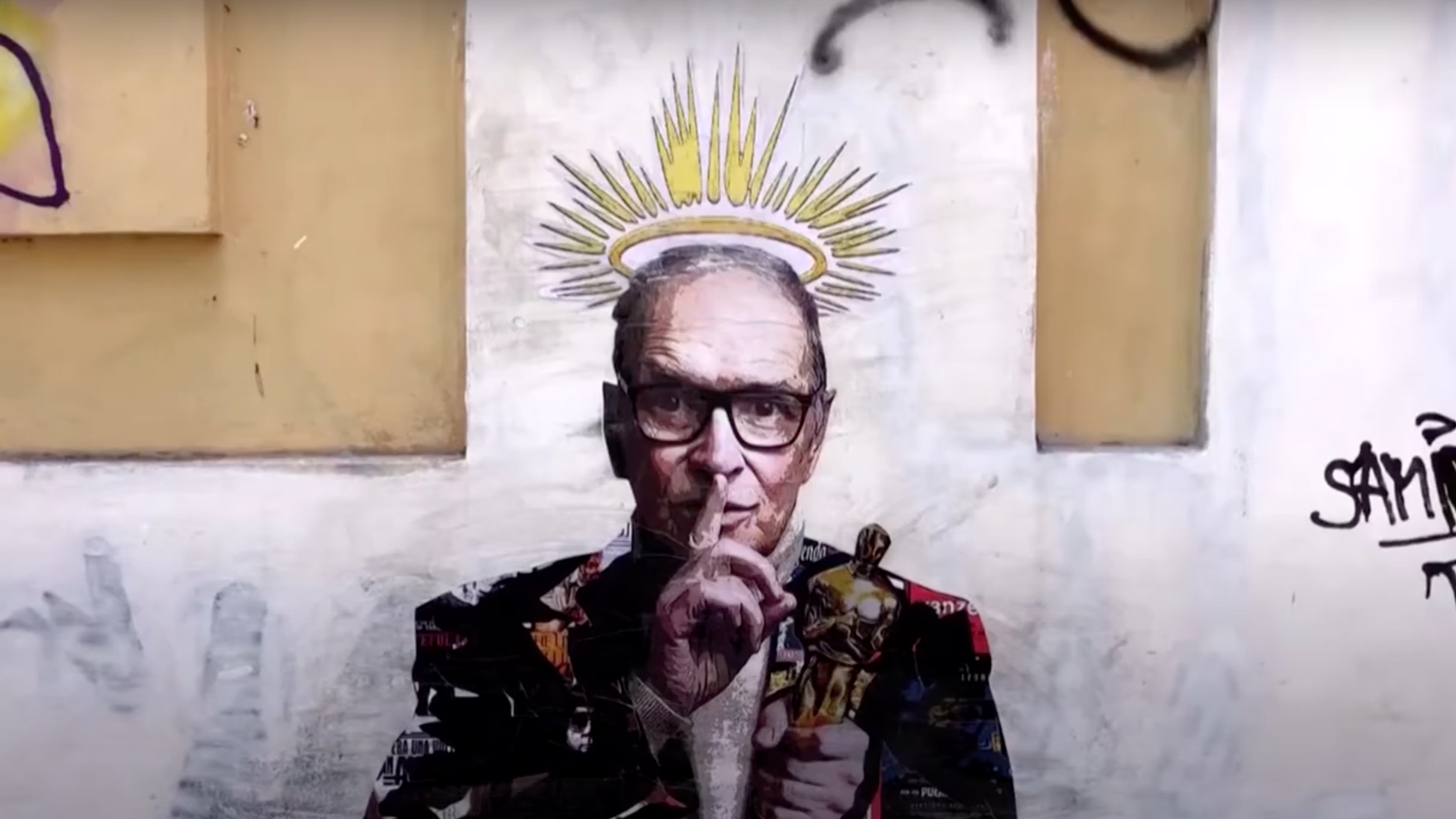Losing ninety-one-year-old composer Ennio Morricone, as we did this week, means losing the sound of cinema’s interior landscapes. Of course, his textural, melancholy compositions defined the raging plains upon which ripping violence, tension-filled crime, passionate romance, and dynamically told dramas were staged. Director Sergio Leone’s Spaghetti Westerns and their spare, dusty trails; Roland Joffé’s verdant South American jungles (The Mission); the stateliness of Brian De Palma’s Prohibition Era Chicago at war with itself (The Untouchables); Quentin Tarantino’s endlessly snowy vistas stained by blood (The Hateful Eight). These were Morricone’s scores at his out-terior finest.
Considering, however, that his loneliest, low-toned, spacious string-and-brass roars and jittery instrumentation and arrangements found focus in a film’s character—Henry Fonda’s smirk from My Name Is Nobody, Warren Beatty’s contorted bellow from Bugsy, Clint Eastwood’s squint in a handful of Italian films that defined actor, director, and composer—the music of Morricone became more than an equal character within each setting. Morricone’s moods were equitable to dialogue, his quivers, cackles, and tings were a form of non-scripted slang, a shorthand between what he was thinking and what the audience should know, a fragile improvisation without definition.
“You want the music—genre or not—to be open to interpretation,” Morricone told me, quietly, through an interpreter, on the occasion of signing a new record deal with Decca Records to release a new reconfiguration of his classics, Morricone 60, back in 2016. Calling from his apartment in Rome after Halloween, the man (or “Il Maestro”) who had by that point penned six hundred compositions sounded ebullient about making new music and signing fresh deals. “I was thrilled,” said the then-eighty-eight-year-old.
Rather than talk singularly about his greatest discordant hits or most moodily popular cinematic themes (by the way, “Spaghetti Western” is a term he is said to hate), Morricone and I went back, for a bit, to his roots in the avant garde scene of his native Italy, the likes of which influenced his last several scores. It was obvious that he loved testing the boundaries of composition and arranging. “I like to experiment still,” said the longtime member of the Italian avant gardist Gruppo di Improvvisazione Nuova Consonanza.
Talking about his initial, often dissonant influences in 20th-century composers (Boulez, Stockhausen, and Luigi Nono) and the use of the “sounds of reality” to give his “instrumental music meaning,” that forum had to find its own form in his recollection. “Which was imminent; not all contemporary music had this, the sounds of reality, at the time,” he said. “But I used this to make a point, a sort of short circuit.”
Hence the sweeping orchestration and noisy elements of scores for Leone, his baroque giallo for Dario Argento and Alberto De Martino; then a run of internationally famed directors from Bernardo Bertolucci, Lina Wertmüller, and Pedro Almodóvar to Hollywood filmmakers such as De Palma, Mike Nichols, Barry Levinson, Warren Beatty, and Oliver Stone.
Ask if he’s heard or felt a difference in what he’s written for Hollywood (he never even thought about moving to America, let alone learning to speak the language) as opposed to Mediterranean or European directors and he claims he never noticed. “It was always up to me to propose that which would solve a problem; that would fit a mood, a scene,” he said. “There are so many options. That is why it is difficult to strike the perfect balance, no matter who the director is or where he is from.”
More important for Morricone is that the music he’s composed must be able to exist outside the realm of cinema. “From the very beginning of the process, when I start writing a composition for a film, I write all music as independent and standalone. If the music is audacious and powerful enough for a film, it must also have a life free from its images.”
Despite his (then) newest album’s old themes, when Tarantino asked him to create a sonic palette for Hateful Eight—another horse opera and Il Maestro’s first western in over thirty years—he didn’t mine familiar, twangy Spaghetti Western sounds. “These were moods nothing like the past, but rather a nontraditional symphonic work,” he said.
Morricone—who started out as a trumpeter—said what excited him most was the ability to turn sound on its head. “I compose a piece of music that is interesting to me, that is relevant, contemporary and challenging because I do not wish to bore my audience,” he said. “Or me, for that matter. I want to feed my audience music that has dignity.” And for the record, “No, I have not played the trumpet in nearly fifty years,” he said with a hearty laugh.
Ask him about the famous names he has worked with, in the United States and Europe, and Morricone, ever the gentleman, did not diss past collaborators. Then again, he didn’t overly praise them, either. “I don’t think it is fair to name any of my collaborators,” he said. “The more you work with somebody, the more you get to know them, their eccentricities, their ways with ideas. You learn the difficulties regarding how they operate and the best ways to solve them.”
The strategy seemed to be successful: He’s composed scores for two finished films (A Rose in Winter, La Corrispondenza) and is in pre-production for another (Aline & Wolfe). Along with making music for films, Morricone loved to tour and conduct, and though several gigs at Brooklyn’s Barclays Center were canceled due to illness, Il Maestro continued to work steadily with groups such as the Czech National Symphony Orchestra, and was at work on a large-scale tour shortly before passing. FL
Note: Segments of this story were taken from a Magnet Magazine interview with Ennio about Morricone 60—you can find that full story here.









